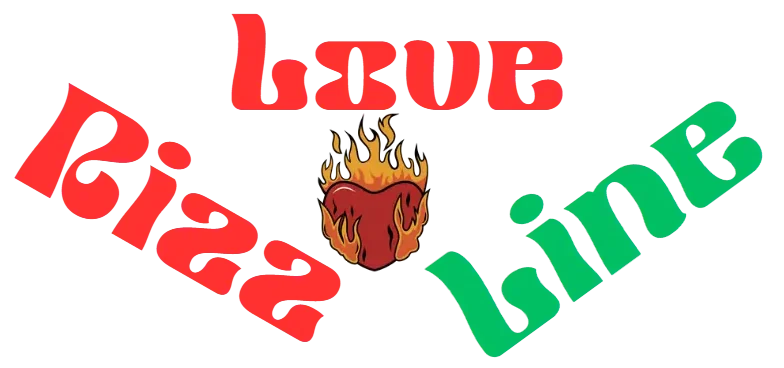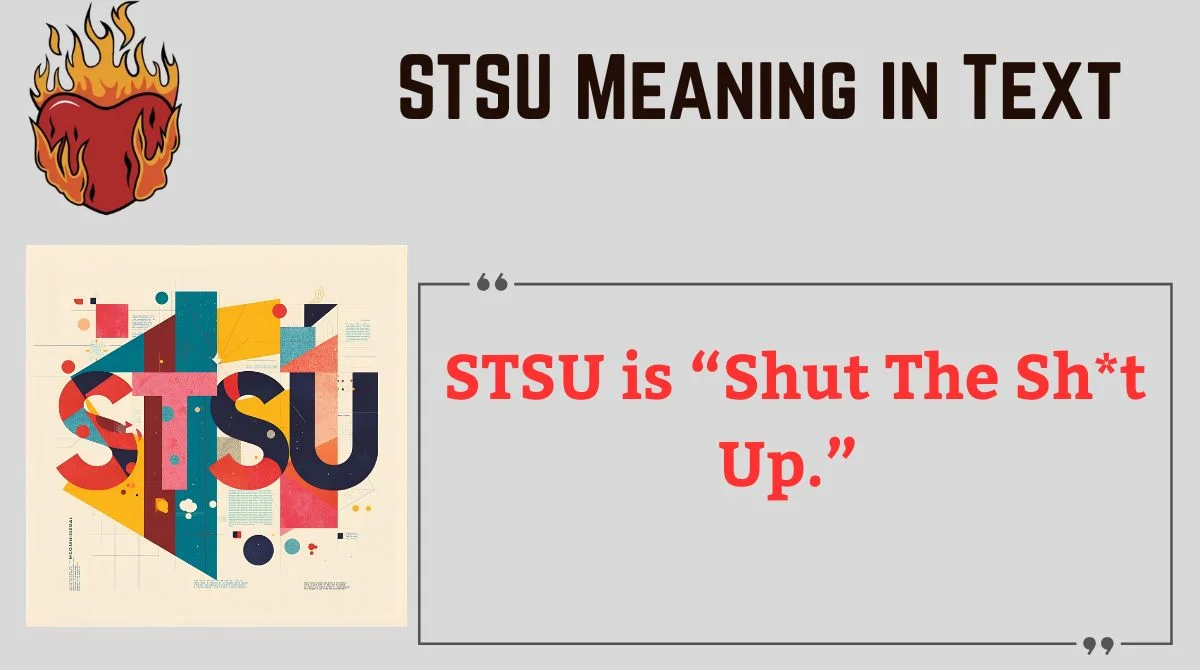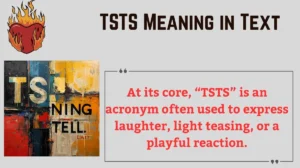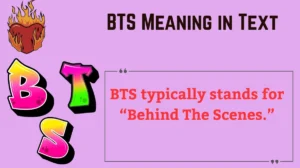Digital conversations move fast. Acronyms like STSU slip into chats every day, often leaving people puzzled or even offended.
If you’ve ever received a message that says “STSU” and felt confused, you’re not alone. This simple four-letter abbreviation can carry different meanings depending on where, how, and why it’s used.
This comprehensive guide breaks down everything you need to know about STSU meaning in text, from its origin to its cultural nuances.
By the end, you’ll know how to use it correctly, how to respond, and when to avoid it entirely.
Why “STSU” Matters in Digital Communication
In the age of instant messaging, language evolves at lightning speed. People use abbreviations to save time, convey tone, and add emotion to otherwise plain text.
STSU is one of those expressions that seems simple but can shift meaning with a single emoji, punctuation mark, or platform.
Understanding what it means isn’t just about expanding your slang vocabulary. It’s about:
- Avoiding miscommunication
- Reading emotional subtext
- Responding appropriately
- Recognizing cultural or regional differences
“Slang isn’t just language; it’s emotion packed into fewer letters.”
What “STSU” Really Means
The most common and widely accepted meaning of STSU is “Shut The Sh*t Up.”
It’s typically used:
- As a sarcastic reaction
- As a playful jab among friends
- Occasionally, as a rude command
However, the tone heavily depends on who says it, how it’s written, and the context of the conversation.
| Form | Meaning | Tone | Example |
|---|---|---|---|
| STSU 😆 | Playful, joking | Friendly | “Bro that was hilarious 😂 STSU” |
| STSU. | Serious or rude | Annoyed or blunt | “Enough already. STSU.” |
| STSU 🤐 | Sarcastic but lighthearted | Teasing | “LMAO STSU 🤐” |
Important: Not every “STSU” is an insult. It’s often used like “shut up!” in a casual, teasing tone.
Origin and Evolution of the Term
Like most slang, STSU didn’t appear in dictionaries overnight. It began circulating in early 2000s chatrooms and gaming communities, evolving from the more common STFU (Shut The F*** Up). Over time, users started swapping the explicit “F” for “S” to soften the tone while still delivering the punch.
Key milestones in STSU’s evolution:
- Early 2000s – First seen on forums and IRC chatrooms.
- Mid 2010s – Picked up by online gamers and meme culture.
- Late 2010s to present – Common across TikTok, Twitter (X), and messaging apps like WhatsApp and Discord.
Unlike formal language, slang spreads organically through memes, humor, and trends, making STSU a product of digital culture rather than official linguistics.
Real-World Usage in Different Contexts
Context decides everything. The same STSU can sound friendly or disrespectful depending on the situation.
Casual Chats
In friendly banter, STSU is often used the same way someone might say “oh shut up!” while laughing.
- “You actually did that? 😂 STSU”
- “Bruh STSU, you’re lying 😭”
Online Communities
Gamers, meme pages, and comment sections use STSU liberally.
- “This meme is gold. STSU and take my upvote.”
- “You missed the jump again?! STSU bro.”
Dating Apps or Flirty Texts
In flirting, it’s usually teasing, not aggressive.
- “You’re too cute omg STSU 😳”
- “STSU 🤭 you’re making me blush.”
| Platform | Common Tone | Example Use |
|---|---|---|
| WhatsApp / Messenger | Friendly or teasing | “STSU you’re so dramatic 😂” |
| Discord | Sarcastic or intense | “STSU before I mute you 😒” |
| TikTok Comments | Light banter | “STSU I can’t stop laughing 😭” |
| Twitter (X) | Playful, ironic | “STSU this is too real 😭🔥” |
Tone, Nuance & Interpretation
Tone gives life to text. An all-caps “STSU!!!” can feel aggressive, but a lowercase “stsu lol” sounds soft and silly.
Tone Indicators That Change the Message:
- Punctuation: “STSU.” vs “STSU😂” → One sounds harsh, the other playful.
- Emojis: Adding 😭, 😆, 🤭 softens the phrase.
- Letter case: Lowercase often looks casual, uppercase can look heated.
| Version | Perceived Emotion | Likely Reaction |
|---|---|---|
| “STSU 😂” | Light teasing | Laughter or playful reply |
| “STSU.” | Annoyed or serious | Confusion, hurt, or defensive reply |
| “stsu 😳” | Flirty, shy | Teasing back |
| “STSU!!!” | Angry or irritated | Defensive or escalating reply |
Pro Tip: When reading or sending slang, context + tone matter more than literal meaning.
Common Misconceptions About “STSU”
Many people misunderstand STSU because it looks similar to other abbreviations. Here are common myths:
- ❌ Myth: STSU is always offensive.
✅ Fact: It can be friendly, sarcastic, or rude depending on tone. - ❌ Myth: It’s just a random slang with no meaning.
✅ Fact: It’s a toned-down version of a much stronger phrase. - ❌ Myth: Everyone understands STSU.
✅ Fact: It’s more common among younger internet users and gamers. - ❌ Myth: It can be used in any context.
✅ Fact: It’s not suitable for formal or professional conversations.
Related Terms, Variants & Alternatives
Language loves variety. STSU isn’t the only way people tell someone to “shut up” online.
| Acronym | Expanded Form | Tone | Usage Context |
|---|---|---|---|
| STFU | Shut The F*** Up | Harsh, direct | Arguments, gaming rage |
| STSU | Shut The Sh*t Up | Softer, sarcastic | Banter, memes, flirting |
| STAHU | Shut The Absolute Hell Up | Strong, exaggerated | Meme culture, strong reaction |
| SU | Shut Up | Neutral | Common in casual talk |
Alternatives with similar tone:
- “Be quiet 😂”
- “You’re too much 😭”
- “Stopppp 🤭”
- “Zip it 😂”
These can replace STSU when you want to avoid harshness.
How to Respond to “STSU” Gracefully
Your reaction depends on how it’s said. Don’t jump to conclusions too quickly.
When It’s Playful:
- Respond with humor or a teasing comeback.
- “You wish 😎”
- “Never 😤”
When It’s Sarcastic:
- Match the tone lightly or brush it off.
- “Fine, I’ll zip it 🤐”
- “You love me talking tho 😏”
When It’s Rude or Aggressive:
- Set a boundary or ignore.
- “That wasn’t cool.”
- “I’ll step away for a bit.”
| Tone of Message | Best Type of Response | Examples |
|---|---|---|
| Playful | Teasing back | “Haha never 😎” |
| Sarcastic | Light or neutral reply | “Alright alright 🤐” |
| Rude | Calm boundary or silence | “Hey, that’s not okay.” / No reply |
Tip: Your emotional reaction shouldn’t come from the word itself but the tone and intent behind it.
Regional & Cultural Nuances
Not every slang term translates smoothly across cultures. What sounds casual in one country can sound disrespectful in another.
- United States: STSU is widely understood as light sarcasm among friends.
- UK & Europe: Similar meaning but often used less aggressively.
- Asia: May not be as common, sometimes interpreted more literally and harshly.
- Middle East & South Asia: Less widespread and may come off as rude if misunderstood.
Why this matters:
Global messaging apps connect people who speak English differently. Cultural context changes tone interpretation. A joke in one region might be an insult in another.
Comparison with Other Popular Internet Slang
| Acronym | Meaning | Tone | Best Used For |
|---|---|---|---|
| STSU | Shut The Sh*t Up | Sarcastic/Funny | Teasing, memes, casual talk |
| STFU | Shut The F*** Up | Harsh, Direct | Arguments, intense conversations |
| LOL | Laugh Out Loud | Light, Friendly | Laughter, casual replies |
| LMAO | Laughing My A** Off | Stronger humor | Funny situations |
| BRB | Be Right Back | Neutral | Pausing a conversation |
| IKR | I Know Right | Affirmative, casual | Agreeing playfully |
STSU lands between humor and light aggression. It’s less intense than STFU but more forceful than “shut up.”
Hidden or Offensive Connotations
STSU can carry a sting if misused. Without emojis, tone indicators, or a familiar relationship, it can easily sound disrespectful.
Situations where STSU may feel offensive:
- During heated arguments
- In messages with superiors or formal contacts
- When written in all caps or with harsh punctuation
- When sent without context or prior conversation
Potential consequences of misuse:
- Damaged relationships
- Misunderstanding or conflict escalation
- Being perceived as rude or disrespectful
Always read the room and relationship before using slang like STSU.
Use in Professional or Formal Communication
Simply put: STSU doesn’t belong in the workplace.
Professional communication requires clarity, respect, and neutrality. Using slang like STSU can:
- Undermine credibility
- Create a hostile tone
- Trigger HR concerns
- Lead to disciplinary action in some settings
Better alternatives:
- “Let’s revisit this later.”
- “Can we pause for a moment?”
- “I think we should move forward.”
| Phrase | Appropriate Setting | Tone |
|---|---|---|
| STSU | Informal, personal, casual | Sarcastic/Playful |
| “Let’s hold that thought” | Workplace, professional | Neutral/Polite |
STSU in Modern Online Culture
STSU is more than a random abbreviation. It’s a product of meme culture, Gen Z humor, and the way digital language bends traditional rules.
- TikTok: Frequently used in comments and captions for reaction humor.
- Gaming: Used in fast-paced chats to express mock frustration.
- Twitter/X: Paired with memes to exaggerate funny or shocking moments.
- Group Chats: A casual way to tell friends to stop teasing.
Why it thrives:
- It’s short and expressive.
- It sits between friendly and cheeky.
- It’s flexible—can be made soft or sharp depending on tone.
“Internet slang like STSU reflects how language adapts to emotions, speed, and humor in digital spaces.”
FAQs
What does STSU stand for in text?
It stands for “Shut The Sh*t Up.” It’s commonly used as a playful, sarcastic, or sometimes rude remark depending on context.
Is STSU always offensive?
No. It can be teasing or serious. Tone, punctuation, and relationship between people matter a lot.
Should I use STSU in professional communication?
No. It’s too informal and can be seen as disrespectful. Use polite alternatives instead.
Is STSU the same as STFU?
Not exactly. STSU is slightly softer and more playful, while STFU is harsher and more aggressive.
How should I reply if someone texts STSU?
Match their tone. If it’s playful, tease back. If it’s rude, either set a boundary or ignore it.
Final Thoughts
STSU isn’t just slang—it’s a small but powerful example of how language changes online. A simple four-letter acronym can feel funny, flirty, or even offensive, depending entirely on context.
Understanding its origin, tone, and cultural nuances helps prevent awkward misunderstandings and makes your digital conversations smoother. Like any slang, use it wisely, read the tone carefully, and know your audience.

Mark Peter is the creative mind behind RizzleLineLove.com, your go-to hub for witty, flirty, and downright hilarious pick-up lines. With a passion for blending humor and charm, Mark crafts content that sparks conversations, breaks the ice, and adds a playful twist to everyday moments.
Whether you’re looking to impress your crush, make your friends laugh, or spice up your social media captions, his work is all about helping you connect — one clever line at a time.



